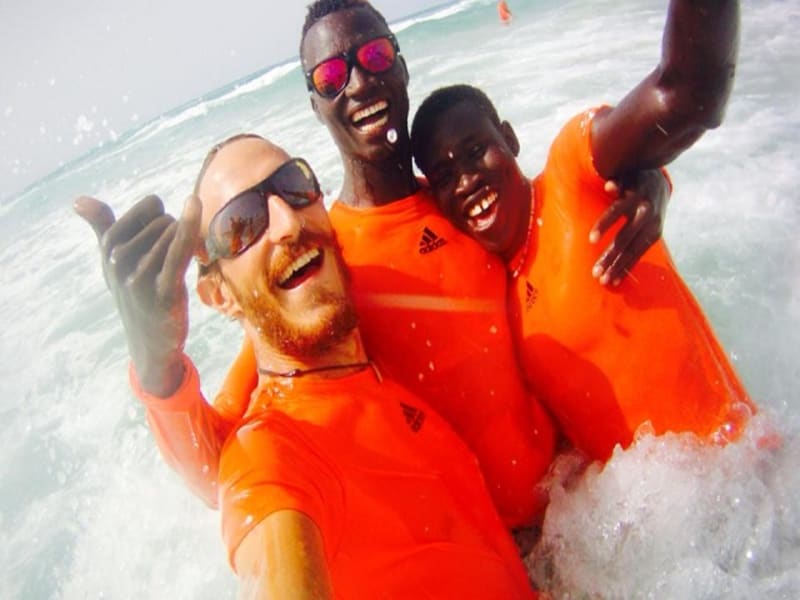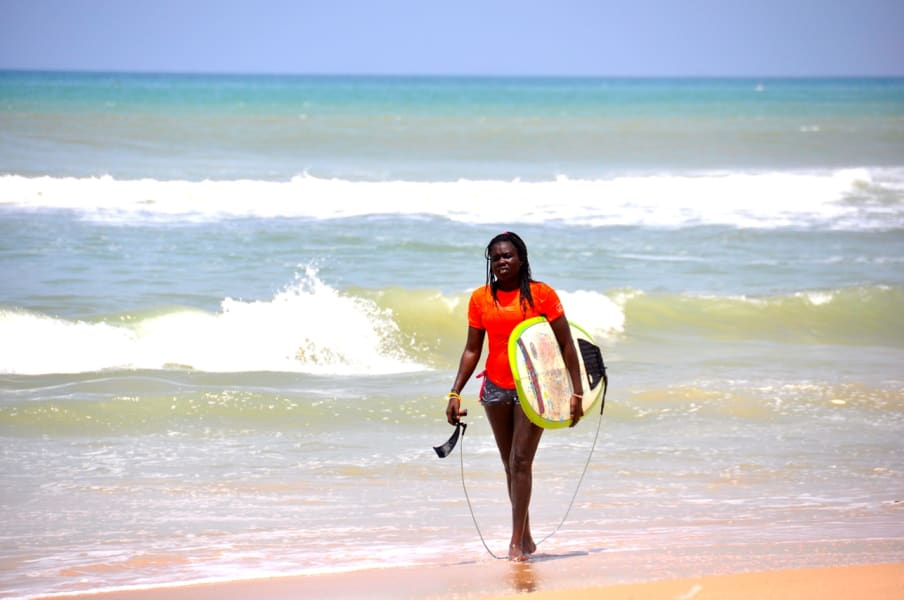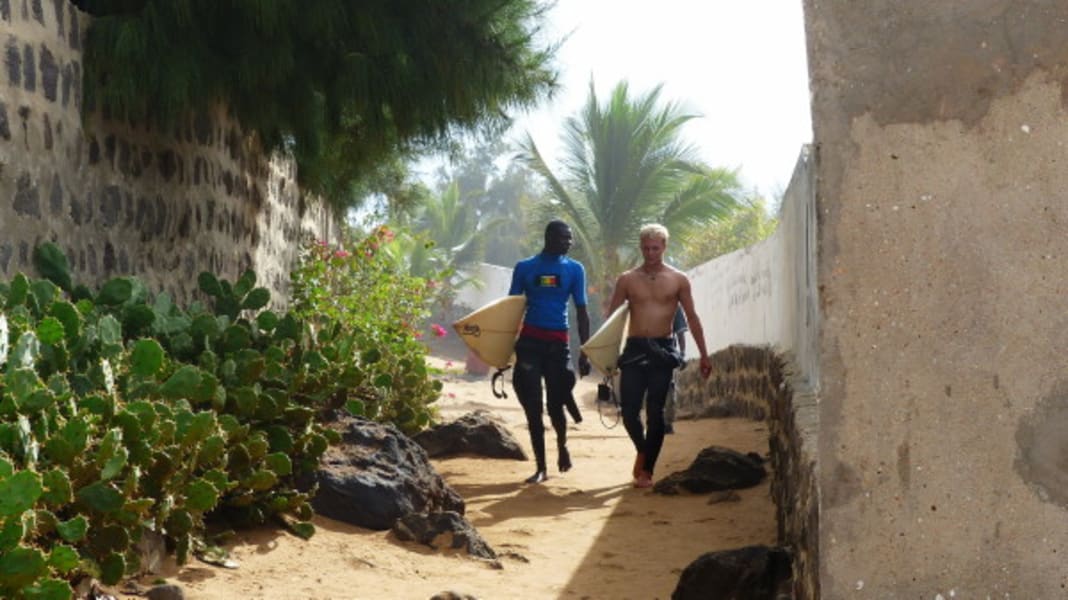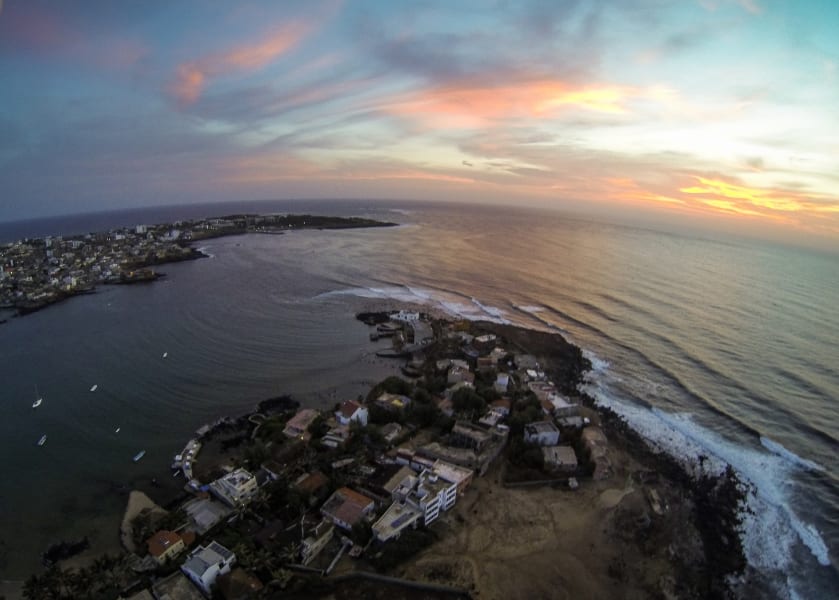Share
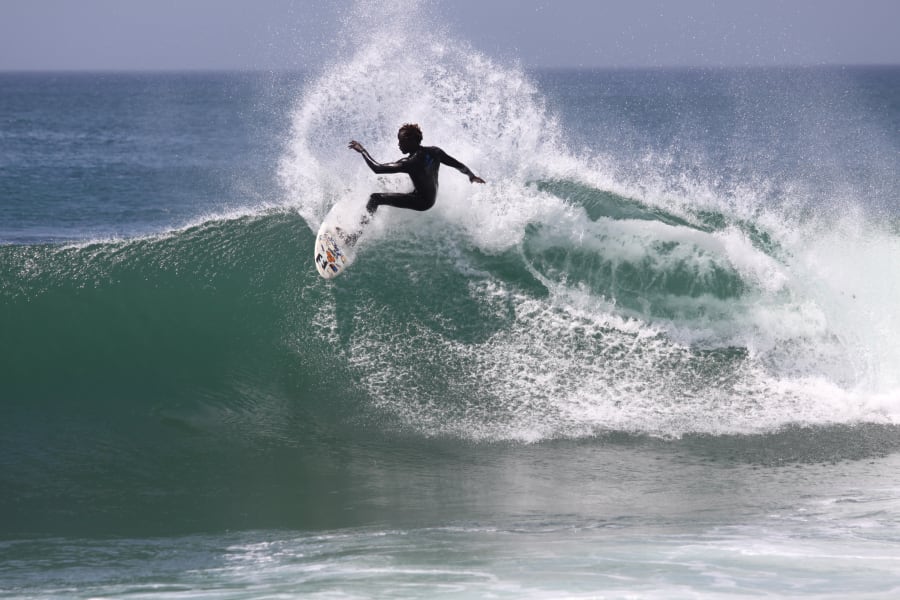

1 of 5
Welcome to Dakar, the vibrant home of a growing community of surfers taking advantage of the warm weather, year-round waves and cheap flights. This city is fast becoming the go-to place for surf enthusiasts looking for an uncrowded beach to hone their craft. Jesper Mouritzen
Why Dakar?
The Senegalese capital is located on the Cape Verde Peninsula on the Atlantic coast. The temperate weather and waves from both the north and south make it the ideal spot for surf-loving locals and tourists.
Looking for somewhere to learn the basics? There's a number of surfing schools and places to stay in Dakar, including the Malika Surf Camp and the N'Gor Island Senegal Surf Camp.
Malika Surf Camp is named after the city where its owners met. Aziz Kane and Marta Imarisio met in Malika, a little village outside Dakar, and fell in love. They are now married with two children and between them they have been teaching tourists and locals how to surf on Yoff beach since 2009.
Across the water, Danish-born Jesper Mouritzen set up N'Gor Island Senegal Surf Camp after a visit to Senegal in 2006. He came to unwind with some friends but once he saw the huge waves and happy surfers he gave up his job managing hotel restaurants, and hasn't looked back since.
Jesper Mouritzen
The Senegalese capital is located on the Cape Verde Peninsula on the Atlantic coast. The temperate weather and waves from both the north and south make it the ideal spot for surf-loving locals and tourists.
Looking for somewhere to learn the basics? There's a number of surfing schools and places to stay in Dakar, including the Malika Surf Camp and the N'Gor Island Senegal Surf Camp.
Malika Surf Camp is named after the city where its owners met. Aziz Kane and Marta Imarisio met in Malika, a little village outside Dakar, and fell in love. They are now married with two children and between them they have been teaching tourists and locals how to surf on Yoff beach since 2009.
Across the water, Danish-born Jesper Mouritzen set up N'Gor Island Senegal Surf Camp after a visit to Senegal in 2006. He came to unwind with some friends but once he saw the huge waves and happy surfers he gave up his job managing hotel restaurants, and hasn't looked back since.
Jesper Mouritzen
The waves
Unlike the more popular surfing destinations on the continent, for example Morocco, in Dakar you can surf all year round.
"In the winter we get all the swell from the north that passes from storms in the U.S. and Europe and in the summer we get swell from South Africa," says Mouritzen. "We have a swell window of 370 degrees and the water is very deep which creates perfect waves for us."
"You have a lot of waves close to each other and it's not crowded compared to Morocco or South Africa," adds Marta.
The waves that these experts ride range between 2 and 10 ft., but there are classes for absolute beginners as well.
Jesper Mouritzen
Unlike the more popular surfing destinations on the continent, for example Morocco, in Dakar you can surf all year round.
"In the winter we get all the swell from the north that passes from storms in the U.S. and Europe and in the summer we get swell from South Africa," says Mouritzen. "We have a swell window of 370 degrees and the water is very deep which creates perfect waves for us."
"You have a lot of waves close to each other and it's not crowded compared to Morocco or South Africa," adds Marta.
The waves that these experts ride range between 2 and 10 ft., but there are classes for absolute beginners as well.
Jesper Mouritzen
The surfers
With roughly 100 local and ex-pat active surfers, as well as scores of tourists visiting Dakar each year, you'll be in good company.
Some camps make up to $125,000 annually and with flights to Senegal getting cheaper and word getting out about the uncrowded beaches, the numbers of visitors are set to increase.
"I employ 15 people from the local community here and every time I have a guest they buy their lunch and drinks from them, so they are getting more business as I bring more business," says Mouritzen.
MARTA IMARISIO
With roughly 100 local and ex-pat active surfers, as well as scores of tourists visiting Dakar each year, you'll be in good company.
Some camps make up to $125,000 annually and with flights to Senegal getting cheaper and word getting out about the uncrowded beaches, the numbers of visitors are set to increase.
"I employ 15 people from the local community here and every time I have a guest they buy their lunch and drinks from them, so they are getting more business as I bring more business," says Mouritzen.
MARTA IMARISIO
Next frontier?
Despite the ideal conditions, there are still some challenges for Dakar's surfing entrepreneurs. The availability of basic supplies hinders many locals who simply can't afford the equipment, and specialist items such as wax for the surfboards has to be rationed all year round.
As well as the lack of supplies, Ebola has affected trade this year in Dakar. Despite the fact that there has only been one confirmed case of Ebola, tourists are wary of traveling to Africa because of the seriousness of the disease across other areas.
"We probably have 15% of the people we had last year," said Mouritzen "We've had no tourists at all." Marta of Malika surf camp agrees; "This year is quite strange because of the Ebola problem in West Africa. A lot of surfers and tourists in general didn't come. So this year it's quite quiet compared to last winter. Usually you see more people travelling in Senegal because the prices are getting cheaper."
Jesper Mouritzen
Despite the ideal conditions, there are still some challenges for Dakar's surfing entrepreneurs. The availability of basic supplies hinders many locals who simply can't afford the equipment, and specialist items such as wax for the surfboards has to be rationed all year round.
As well as the lack of supplies, Ebola has affected trade this year in Dakar. Despite the fact that there has only been one confirmed case of Ebola, tourists are wary of traveling to Africa because of the seriousness of the disease across other areas.
"We probably have 15% of the people we had last year," said Mouritzen "We've had no tourists at all." Marta of Malika surf camp agrees; "This year is quite strange because of the Ebola problem in West Africa. A lot of surfers and tourists in general didn't come. So this year it's quite quiet compared to last winter. Usually you see more people travelling in Senegal because the prices are getting cheaper."
Jesper Mouritzen
